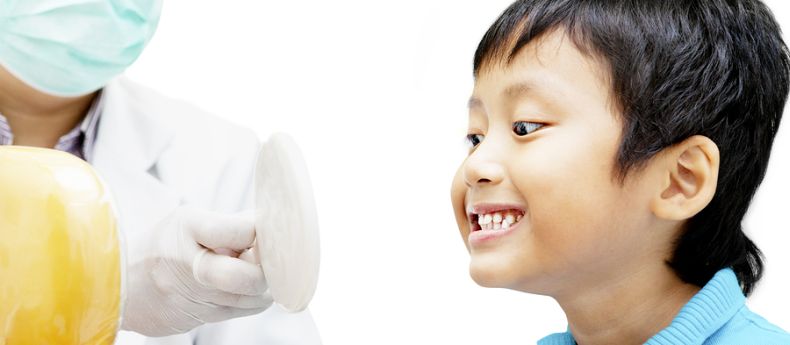
Healthy Teeth, Happy Kids!
When should I first start caring for my baby’s teeth?
It’s never too early to start good dental hygiene for your baby. Gently clean your child’s gums with a damp piece of small gauze after feeding. Feeding too close to bedtime can allow bacteria to form and stick on the teeth. Under two years old, children can add a smear of children’s toothpaste, or do without using toothpaste, but if using a toothbrush be sure to use a soft bristled one with a small brush head to gently clean your child’s mouth.
From two to six years old, children are old enough to start brushing on their own with mom and dad’s help. Use a pea size amount of children’s toothpaste with fluoride. First have your child brush, (using a timer set for two minutes is a good way to train your child), then follow up by helping them clean again afterwards to catch any missed spots. Children should brush twice a day, flossing once at night. You can help your child to floss as soon as their teeth start to touch—I recommend using floss sticks to help children floss, although any floss is fine.
When should my child have their first cleaning? And what about those x-rays?
The American Academy of Pediatric Dentistry says by the child’s first tooth eruption, and no later than their first birthday, the child should be taken to see the dentist. After that, a checkup is recommended every six months.
Pediatric dentists are specially trained in behavior management techniques to lessen stress for children during checkups and procedures. However, parents can help their children prepare for the visit by reading books to them featuring happy visits to the dentist. Never threaten or scare your child by saying you or the dentist will pull out their tooth, trying to punish naughty behavior.
Dental x-rays are used to check for cavities—this means, yes, your child should have them. Although x-rays do emit some radiation, it’s actually normally less radiation than natural sources like the sun and the trees around us.
What is “baby bottle mouth,” and how important are my child’s first set of teeth?
“Baby bottle mouth” or early childhood tooth decay happens when young children are able to feed on a bottle or with mom for prolonged periods of time, often while falling asleep or right before bed. It’s so easy to let our children fall asleep while feeding, but it can actually be dangerous to their dental and overall health.
Even though it may not seem like a child’s first set of teeth is all that important—after all, they fall out, right?—improper care of a child’s first set can affect the eruption and development of their permanent adult set of teeth. If untreated, this decay can not only cause cavities, but lead to infection and swelling of the mouth and face, which can cause pain. Early loss of baby teeth due to untreated cavities can lead to malnutrition, speech problems and effects the child’s confidence and self-esteem. In very severe cases, the dangerous bacteria can travel to the child’s brain and cause death.
What affect does thumb sucking and pacifiers have?
Excessive thumb sucking and pacifier use can change the arc of your child’s mouth, if used too long. If you have your kids stop by age four, changes to the dental arch, tooth position and jaw alignment can be reversible.
How does diet affect a healthy smile?
All food and beverages contain fermentable carbohydrates (sugars and starches), including rice, noodles and breads, all with the potential to cause tooth decay. Tooth decay is caused by the interaction of bacteria that are naturally present in the mouth with these carbohydrates. These tiny organisms form a sticky, colorless, soft film on the teeth called ‘plaque.’ During the day, plaque builds up naturally on clean teeth, even when there is no food in the mouth.
When we consume foods that contain fermentable carbohydrates (sugars and starches), the bacteria break down the carbohydrates to create acid. Over time, the acid dissolves the minerals in the hard outer layer of the tooth. This is called ‘de mineralization’ and can lead to tooth decay. Eating a high-frequency diet with sugar and starches, your teeth don’t have time to re-mineralize, (a natural process by which our saliva to return minerals to teeth to reduce the extent of tooth decay). Tooth decay is likely to occur when there is more de-mineralization than re-mineralization over a period of time. This may happen in the presence of carbohydrates when teeth are not cleaned. It can also happen when foods and drinks containing carbohydrates are consumed frequently, without allowing enough time in between meals for re-mineralization to occur.
Ideally, we would brush after every meal, but that’s not always an option. Encouraging kids to drink water after meals and feeding can help wash away lingering bacteria. Also, watering down juice is a good way to decrease the amount of sugars in your child’s diet. For older kids, chewing a sugar-free gum can help clear away bacteria and re-mineralize the teeth. Cheese is also a good natural tooth protector—it helps fight cavities and re-mineralize teeth.
What about fluoride?
Many western cities have fluoride in the drinking water, so many parents ask about what they can better do to protect their children’s teeth. They can certainly come in to their nearest United Family Dental Department once a month for a fluoride treatment. Although, if children are regularly using a children’s fluoride-enhanced toothpaste, they should be fine.
Copyright United Family Healthcare 2014 All right reserved - 京卫网审[2014]第1927号 - 京ICP备13017554号-4





